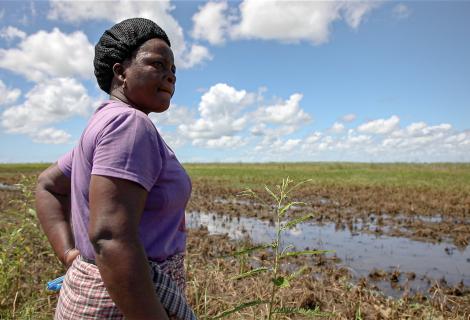Smallholder farmers must benefit from Covid-19 bailouts

ActionAid responds to new UN figures showing the pandemic is pushing millions more people into hunger
As the Covid-19 crisis pushes millions more people into hunger, ActionAid warns that farmers must be recognised and supported as frontline workers to ensure supplies of affordable and healthy food in the months ahead.
Since the start of the pandemic, ActionAid’s emergency response teams have been distributing millions of food packages to vulnerable communities and helping smallholders get their produce to markets.
But small family farmers have received little help from Covid-19 bailouts to date, and are struggling to grow and sell their crops, contributing to rising food prices and growing hunger.
Ruchi Tripathi, head of resilient livelihoods and climate justice at ActionAid, says:
“Rising global hunger shows the Covid-19 health and economic crisis is fast escalating into a food crisis. The pandemic is pushing millions more people into poverty and hunger.
“Farmers must be recognised as frontline workers. The immediate threat of coronavirus and the climate crisis, must act as a wakeup call that no lasting global recovery can be achieved without investment in women-led sustainable local food production to transform our farming systems.”
Small family farms provide as much as 80% of the food consumed in Africa and Asia, yet they are being overlooked in Covid-19 responses. Women farmers are struggling with the triple whammy of lost earnings, soaring levels of gender-based violence during lockdowns, and increased unpaid care work, such as looking after sick relatives.
ActionAid warns that many farmers may be forced to sell their tools, land, and assets unless government includes them in social protection schemes and other support such as access to appropriate seeds, markets and finance.
The UN’s State of Food Security and Nutrition in the World report, published today, shows that more than 690 million people are suffering from hunger, with the Covid-19 crisis expected to make up to 132 million more severely food insecure this year.
“Hunger has already been on the rise for the past five years due to climate change, putting the global goal to end hunger by 2030 shamefully off track,” says Ruchi Tripathi.
“It is urgent for Covid-19 recovery plans to prioritise investment in sustainable, climate-resilient local food systems to ensure that our population can survive even greater challenges as the climate crisis intensifies.”
ActionAid is calling for:
- Governments to procure Covid19 food relief and school meal supplies from local producers to help sustain their livelihoods.
- Minimum income support for farmers and farm workers.
- Support for programmes that connect smallholder farmers to consumers, through direct local sales, door to door sales, local markets with physical distancing measures, independent shops, public procurement and food apps that support local producers.
- Replenishment of the Global Agriculture and Food Security Programme (GAFSP), an innovative fund to support low-income countries’ agriculture introduced in the wake of the 2008 food crisis, to avoid another global hunger emergency.
- Debt cancellation and emergency liquidity support for developing countries so that they can expand social protection, health care and other essential services to rural communities and other groups hard-hit by Covid-19.
- Longer-term Covid-19 recovery plans to include significant investment in creating green livelihoods in sustainable, climate-resilient agriculture.
How ActionAid is responding to the Covid-19 crisis and rising food poverty across the Global South and North:
- In India, between March and June, ActionAid delivered food support packages to 3.9 million people as part of its Covid-19 crisis response, targeting families in the poorest and most marginalised communities, including survivors of gender-based violence, sex workers, ethnic minorities, disabled people, migrants and informal workers.
- In Brazil, ActionAid and partners in the semiarid region, one of the driest areas of the country, delivered food baskets sourced from smallholder farmers to more than 8,000 families. This provided vital food relief for families whose livelihoods have been lost due to the pandemic and generated income for farmers, including many women, who have been impacted by Covid-19 restrictions.
ActionAid, along with more than 800 organisations, networks and movements, is also supporting requests for investment in Brazil’s Food Acquisition Programme, which was introduced in 2003 to support smallholder farmers and provide access to national markets serving hospitals, schools and popular restaurants. In recent years, funding for this vital programme to improve food security has been dramatically reduced. Activists are asking for one billion reais to support smallholder farmers affected by the closure of markets due to the pandemic. So far R$500m has been awarded.
- In Italy, ActionAid’s food poverty programme was setup three years ago, with the aim of supporting local food banks, in response to increasing need for food assistance, particularly from newly arrived migrants, fleeing from conflict, hunger and climate change in the Global South. But as coronavirus hit, growing numbers of local citizens, pushed into food poverty by the pandemic, now rely on the project to feed their families.
Demand for food assistance has increased by 20% since the start of the pandemic – the food bank now supports around 1,000 people with food and other essentials including nappies and personal protective equipment.
- Before the pandemic, ActionAid was already responding to a food and climate crisis across Southern Africa caused by the worst drought in the region for 35 years, two cyclones and flooding, leaving 45 million people experiencing food insecurity.
In Zimbabwe, before Covid-19 hit, 7.7 million people were food insecure and employment was as high as 80%. The climate crisis has shortened the agricultural season leaving poor, smallholder farmers, the majority of whom are women residing in rural areas, with dramatically reduced yields.
Nearly 9 million Zimbabweans are expected to be suffering from hunger by October, while the price of maize has soared by 66% to $5 per 20kg.
ENDS.
For more information and interviews contact jenna.pudelek@actionaid.org or call +7795642990.